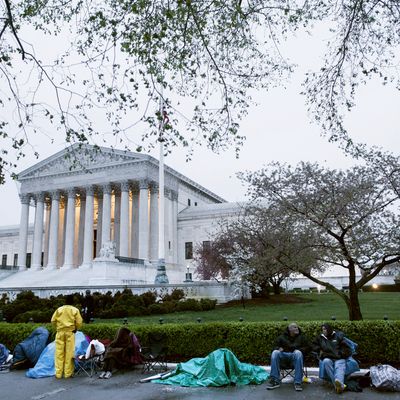
On Monday, the U.S. Supreme Court will commence three days of arguments about President Obama’s health-care law, the Affordable Care Act, often and pejoratively referred to as “Obamacare.”
Beyond the actual impact of the high court’s decision on the delivery of health care in the nation, there’s the political reverberation: Republican presidential candidates have already stated they are determined to repeal the act, the signature piece of domestic legislation passed under the Obama administration. The court is likely to hand down its decision in June, before both Democrats and Republicans hold their nominating conventions.
But before argument about the actual legislation begins, the court must address whether the case, brought by opponents including 26 states and officially titled Department of Health and Human Services, et al., Petitioners v. Florida, et al., may be addressed at this time, i.e., is it “ripe.” That’s an issue because the so-called individual mandate, which would require Americans to buy health insurance, is not scheduled to take effect until 2014. There will be 90 minutes of argument on this point alone on Monday.
The central issue in the case is the constitutionality of a law requiring Americans to buy health insurance. The Washington Post summarizes the battle lines:
The Obama administration points to the arc of decisions stretching back to the New Deal in which the court has said the Commerce Clause and other constitutional provisions provide Congress authority to deal with national economic problems.
The uninsured consumed about $116 billion in health-care services in 2008, Solicitor General Donald B. Verrilli Jr. told the court in the government’s brief. The amount was absorbed by providers or passed along to others in increased health insurance premiums, about $1,000 a year per family.
“Because health insurance is the principal mechanism for meeting these unpredictable and often expensive liabilities, it was reasonable for Congress to invoke that same mechanism to address the problem of uncompensated care,” Verrilli wrote.
Paul D. Clement, representing Republican officials in 26 states who have challenged the law, warns the court that the mandate “rests on a claim of federal powers that is both unprecedented and unbounded.”
The magnitude of this case is underscored by the amount of argument the court will hear as well as the access it will allow. The court has scheduled six hours of hearings over three days, the most in 45 years. “They will examine the law in detail, even parts that no judges below them have found constitutionally questionable,” the Post reports. And “while cameras are still forbidden, the court has changed its rules to release audiotape and transcripts of the arguments each day.”
Ancillary issues include whether a part of the act may preserved if another part is stricken. That argument will take place on Wednesday:
Mr. Clement argues the challengers’ view that the entire law must go, Deputy Solicitor General Edwin Kneedler argues for the government, which says most of the law should stand, and court-appointed lawyer H. Bartow Farr III advocates a third view–that the rest of the law can stand in its entirety if the individual mandate is struck down.
Although impartial, the justices are not blind or deaf to the charged atmosphere surrounding this case. Concerned citizens have been lining up since last Thursday for the opportunity to watch the hearings.
“We are all deeply committed to the common interest in preserving the court’s vital role as an impartial tribunal governed by the rule of law,” Chief Justice Roberts wrote in his annual report on the state of the judiciary.
Meanwhile White House senior adviser David Plouffe sounded off on the upcoming battle on Meet the Press on Sunday, saying that Americans were benefiting from elements of the provision that have already been implemented. Of course this case has reached the Supreme Court with impressions from lower court judges. The Wall Street Journal tallies the existing scorecard:





























